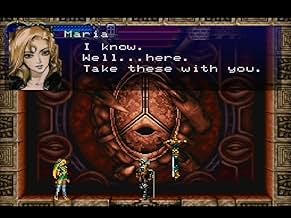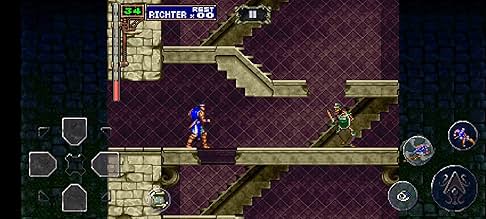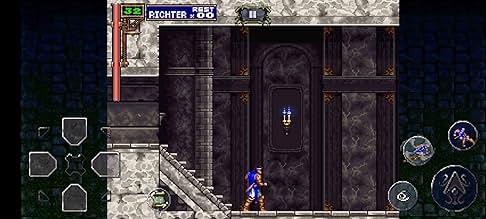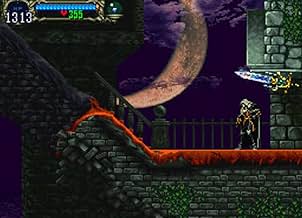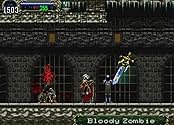Ajouter une intrigue dans votre langueIn 1797, Shaft manages to regain power through a curse placed on Richter Belmont. Four years later, Dracula's son Alucard awakens from his eternal slumber, intent on destroying his evil fath... Tout lireIn 1797, Shaft manages to regain power through a curse placed on Richter Belmont. Four years later, Dracula's son Alucard awakens from his eternal slumber, intent on destroying his evil father once and for all.In 1797, Shaft manages to regain power through a curse placed on Richter Belmont. Four years later, Dracula's son Alucard awakens from his eternal slumber, intent on destroying his evil father once and for all.
- Réalisation
- Scénario
- Casting principal
- Alucard
- (English version)
- (voix)
- Richter Belmont
- (English version)
- (voix)
- (as Scott McCulloch)
- Maria Renard
- (English version)
- (voix)
- Count Vlad Dracula
- (English version)
- (voix)
- (as Michael G.)
- Succubus
- (English version)
- (voix)
- Death
- (English version)
- (voix)
- …
- Lisa Farenheights
- (English version)
- (voix)
- Shaft
- (English version)
- (voix)
- Alucard
- (voix)
- Dracula
- (voix)
- Succubus
- (voix)
- …
- Death
- (voix)
- …
- Faerie Familiar
- (voix)
- …
- Demon Familiar
- (voix)
- …
- Master Librarian
- (English version)
- (voix)
- …
- Succubus
- (English version)
- (voix)
- …
Avis à la une
CastleVania: SotN is not without its faults. I will admit, the plot is a lame excuse to bring back Dracula for yet another round of CastleVania (if you can consider it having a plot at all), and the voice-acted dialogue screams cheesy b-film. In the end, that's made me like SotN all the more now then I did in 1997 when it first debuted. My only -real- complaint against SotN is its difficulty setting it's too easy to beat.
Symphony of the Night's success comes from the fact that it acknowledges it is a game to be played, not a movie to be watched or a novel to be read. You -play- CastleVania, and all the game elements are as rock-solid as they come. It plays as a fantastic exploration game in the same vein as Super Metroid, which was a step away from previous CastleVania straight-action-side-scroller formula it had used since the original NES game.
Adrian Fahrenheit Tepes, aka Alucard, is the most intriguing CastleVania character the gamer has ever taken control of (and he's way badder than he was in CastleVania3). No more the Belmont Vampire Hunter, now we play as the son of Dracula to take on the father, and as we explore the Demon Castle we really get to tap into Alucard's growing vampiric powers . . . and to this date, I've never seen a game character to top Alucard's ability to become a cloud of mist on command.
Not just one, but two beautifully drawn castles to explore, some of the best boss/enemy designs and a well thought out castle-design. I'd of liked to have seen some instant-death pitfalls/spikes/lava/whatever (and a way of knowing that it is instant death and not another route to explore); most gamers hate 'em, but with SotN's wonderful controls it wouldn't have been much of a problem avoiding them unless you just get careless. Towards the end of the game, Alucard's abilities would make falling into them virtually impossible.
CastleVania also sports my favorite video-game artwork and musical score by the talented Ayame Kojima and Michuru Yamane respectively. Though the premise of the exploration and level ups are borrowed from other games, SotN stands out as its own. By the music, artwork, setting, characters, and gameplay, it is distinctly CastleVania. Nowhere else have I seen game so distinctly its own.
The story starts out with Richter Belmont about to face off against Dracula. This is basically a recap battle showing the final battle from the game Castlevania X or something to that effect for the SNES or the other game that it was based off of for a computer gaming system only sold in Japan. Suffice to say, I want to play that game, but it is rare and expensive. After the battle is won, you see Alucard (Dracula's son) storming the castle. He seems unbeatable, until the Grim Reaper takes away all his powerful equipment. Now Alucard must navigate his way through the castle fighting monsters of all kinds so that he can gain abilities and equipment that will help him win the day. From time to time you cross paths with a woman named Maria who is looking for Richter...who has disappeared. Alucard sees him at one point, but it seems he is the lord of the castle now! The fighting is different than previous Castlevania games in that you use a sword and can also use a shield. Though no matter how powerful a shield I got, it never seemed to deflect anything. You could also use potions, buy armor and things that one is more accustomed to seeing in a role playing game. You also have the ability later to change into different things such as a wolf, a bat and mist. You can change into mist and basically bypass any really difficult areas later in the game. So there are many different aspects to the game, but it still feels like you are playing Castlevania. I can see where the Metroid references come from, but how many Metroid games actually followed this format? I believe only Super Metroid followed it to a tee.
I enjoyed this game, but there are some improvements that could of been made. First, is the fact there is spoken dialog in this game. I am not going to complain about how bad it is (though it is not top notched), I am simply going to say it needed more. Basically, they did not really keep the story advancing and at times it was simply Alucard moving from room to room and then coming across a boss out of the blue. There needed more interaction between Alucard and other characters to keep the player up to date on the story. The game also has a cheap ending that one can easily get by accident if one is not entirely sure what to do. Basically, the game can end without a final showdown with Dracula. And as good as the music is, the song they play during the credits sounds like it came from a romantic drama.
Overall, this game was a fun game to play. It had more to it than your standard Castlevania, while not overstaying its welcome like so many games of today do. The music is good (I especially enjoy the piece right at the beginning as Alucard dominates early on) and the game play is simple to pick up. This one is as good as my other favorite Super Castlevania IV, and could of been even better had it made a few tweaks.
Le saviez-vous
- AnecdotesFirst Castlevania game to separate from the "stage-by-stage" gameplay of earlier games, and create a more Metroid-esque play experience, which also featured RPG elements (leveling up, equipping new stuff, item usage, etc.)
- GaffesObjects can be found such as the Alucard Family Shield and the Alucard Family Sword. Since Dracula is the head of the family, the objects should be referred to as Dracula Family objects.
- Citations
Richter Belmont: Die, monster! You don't belong in this world!
Dracula: It is not by my hand that I am once again given flesh. I was brought here by humans who wish to pay me tribute.
Richter Belmont: Tribute? You steal mens' souls and make them your slaves!
Dracula: Perhaps the same could be said of all religions...
Richter Belmont: Your words are as empty as your soul. Mankind ill needs a savior such as you.
Dracula: What is a man?
[tosses goblet, which breaks]
Dracula: A miserable little pile of secrets. But enough talk, HAVE AT YOU!
- Versions alternativesThe version released for the Sega Saturn in Japan suffered from some glitches in comparison to the Playstation version, but also included two very large extras. One was the ability to play as Richter Belmont throughout the entire game from the start, instead of having to complete the game and enter a special code as your name. The other was to be able to play as Maria, also from the very beginning.
- ConnexionsFeatured in Playstation Underground Volume 2 (1997)
- Bandes originalesI Am the Wind
(Ending Theme)
Written by Tony Haynes, Jeff Lorber & Rika Muranaka
Arranged by Jeff Lorber & Rika Muranaka
Performed by Gerald Albright (sax), Louis Conte (percussion), Cynthia Harrell (lead vocal/back chorus),
Jeff Lorber (keyboards), Rika Muranaka (keyboards), Nate Phillips (bass),
, John Robinson (drums) & Michael Thompson (guitar)
Produced by Rika Muranaka
Recorded by Robert Chinelli, Eric Greedy, Jeff Lorber & Larry Mah
Mixed by Al Schmitt
Meilleurs choix
Détails
- Date de sortie
- Pays d’origine
- Langue
- Aussi connu sous le nom de
- Castlevania: Symphony of the Night
- Société de production
- Voir plus de crédits d'entreprise sur IMDbPro
- Couleur

